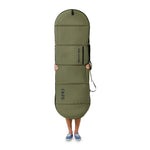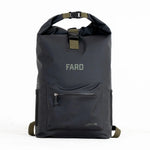
For every surfer, a surfboard represents more than just a piece of equipment; it's an investment, a passion, and a gateway to the ocean's embrace. Protecting this valuable asset is paramount, and a high-quality surfboard bag is an indispensable tool in its preservation. This comprehensive guide aims to equip both new and experienced surfers with the knowledge necessary to make an informed decision when selecting surfboard bags, ensuring their boards remain in pristine condition for countless sessions.
The Role of a Surfboard Bag
The decision to invest in a surfboard bag extends beyond mere aesthetics; it is a strategic choice for proactive board care. Surfboards are susceptible to a range of damages that a proper bag can effectively mitigate.
Protecting Your Investment from Common Hazards:
- Physical Damage: Dings, pressure dents, and scratches are the most frequent casualties of unprotected transport and storage. A bag provides a crucial layer of cushioning against impacts from car doors, garage walls, or even other boards.
- UV Radiation Exposure: Prolonged exposure to direct sunlight can lead to the yellowing and degradation of your board's resin, weakening its structural integrity over time. Bags with UV-resistant materials offer essential solar protection.
- Heat Damage: Excessive heat can delaminate your board's layers or melt wax, creating unsightly and potentially damaging messes. Vented bags help regulate temperature, preventing such issues.
- Wax and Debris Management: A bag contains wax residue and sand, keeping your vehicle and living spaces clean and free from gritty remnants of your surf sessions.
- Travel Rigors: For those who pursue waves beyond their local break, a robust travel bag is non-negotiable. Airlines and rough handling during transit pose significant threats that only specialized bags can withstand.
Essential Surfboard Bag Features to Prioritize
Beyond the basic type, the efficacy of a surfboard bag is defined by its integrated surfboard bag features. Discerning these details can significantly impact your board's safety and your convenience.
- Padding Thickness (mm): This is perhaps the most critical feature. As detailed above, the thickness directly correlates with impact absorption. For example, a 5mm padded bag offers good daily protection, while a 8mm+ bag is essential for airline travel.
- Material Durability and Reflectivity: Look for robust, tear-resistant fabrics such as ripstop nylon, 600D polyester, or marine-grade tarpaulin. Many quality surfboard bags incorporate reflective materials (e.g., heat-reflective silver tarpaulin) to deflect sunlight and prevent heat buildup, crucial for protecting your board from delamination.
- Zipper Quality: Zippers are often the first point of failure. Opt for heavy-duty, corrosion-resistant zippers (e.g., nylon coil zippers or larger gauge plastic zippers) that can withstand salt, sand, and frequent use. Double zippers are beneficial for security and ease of access.
- Ventilation Systems: Small vents or mesh panels are vital for air circulation, preventing heat traps, wax melting, and the growth of mold or mildew, especially when storing a damp board.
- Handles and Straps: Padded, ergonomic handles positioned strategically (center, nose, tail) enhance carrying comfort. An adjustable, padded shoulder strap is essential for single-board bags, while multiple grab handles are crucial for maneuvering heavier travel bags.
- Fin Slot / Access: Some bags feature a dedicated fin slot, allowing you to transport your board with fins attached. While convenient, removing fins for transport generally offers superior protection for both fins and board.
- Internal and External Pockets: Convenient pockets are ideal for stashing wax, leashes, fin keys, or other small essentials, keeping them organized and preventing them from scratching your board.
- Nose and Tail Reinforcement: The nose and tail are the most vulnerable points of a surfboard. Extra layers of padding or reinforced materials (e.g., PVC patches) at these ends provide critical impact protection.
- Internal Compression Straps (Travel Bags): In multi-board travel bags, internal straps secure boards, preventing them from shifting and damaging each other during transit.
- Wheels (Travel Bags): For heavy, multi-board travel bags, integrated wheels are a game-changer, significantly easing transport through airports and parking lots.
Selecting the Ideal Bag for Your Surfing Lifestyle
The "best" surfboard bag is contingent upon your specific surfing habits, board type, and travel frequency. Here's a comparative analysis to guide your decision:
|
Usage Scenario |
Recommended Bag Type |
Key Features to Look For |
Faroboardbags.com Recommendation Example |
|
Everyday Local Beach Trips (Car/Walk) |
Board Sock, Canvas Bag or Day Bag |
Lightweight, basic scratch protection, UV resistance (for Day Bag), comfortable carry handle. |
Faro "Daily Shredder" Sock or "Beach Cruiser" Day Bag |
|
Weekend Road Trips (Short-Medium Distance) |
Padded Day Bag (5-7mm), or Canvas Board Bags |
Durable fabric, robust zippers, good padding at nose/tail, comfortable shoulder strap. |
Faro "Road Warrior" Padded Day Bag (Excellent for regional travel) |
|
Frequent Regional Travel (Flights within Country) |
Enhanced Padded Day Bag (7-10mm) |
Heavy-duty zippers, multiple carry handles, reinforced critical zones, some ventilation. |
Faro "Continental Commuter" Bag (Offers superior protection for frequent domestic flights) |
|
International Surf Expeditions (Long-haul Flights) |
Heavy-Duty Travel Bag (10mm+) |
Max padding, multi-board capacity, reinforced nose/tail, strong zippers, wheels, internal straps. |
Faro "Global Explorer" Travel Bag (Designed for ultimate protection during international transit) |
|
Longboard/SUP Storage & Transport |
Dedicated Longboard/SUP Bag |
Specific sizing, robust carry handles, sufficient width/volume capacity, potentially wheels. |
Faro "Big Wave Guardian" Longboard Bag (Tailored for larger boards) |
Conclusion
The selection of a surfboard bag is a pivotal decision for any surfer dedicated to preserving their cherished board. By understanding the various surfboard bag types, prioritizing essential surfboard bag features, and considering your specific usage scenarios, you can confidently choose a protector that offers optimal safeguarding against the elements and the rigors of travel.
At Faroboardbags, we are committed to providing premium, durable, and expertly designed surfboard bags for every adventure. Our comprehensive range is meticulously crafted to meet the diverse needs of the global surfing community, ensuring your board receives the protection it deserves. Explore our collection today and invest in the longevity of your surfboard.
For personalized recommendations or further inquiries, please do not hesitate to contact our team that is ready to assist you in making the perfect choice.





